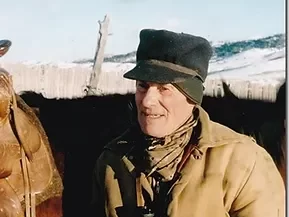Murl was born August 23, 1903 near Eagle Peak, Wyoming in Northern Albany County. He was the first son of Walter “Skinny” and Maud (Newell) Robbins. Murl had two brothers, Jim and Arthur, and a sister, Mary. Growing up, Murl lived with, and worked for, his aunt and uncle, Jim and Freda Newell. At age 14 he worked cattle on the open range for Frank Dobson in Garrett, WY. Murl would remain in Northern Albany County and homestead the area just as his father did and his grandfather did in nearby Boxelder, WY.
Over the years, Murl built his ranch piece by piece. In 1929, he and his newlywed wife, Bess Gore, homesteaded on Mule Creek in Northern Albany County. He later sold his homestead and purchased land from Wilson Bell in Marshall, WY. This was the beginning of his ranch and where he and his wife would raise their two sons, Donny and Bobby, and his step daughter, Rae. Murl and his brother, Jim, then bought and split a ranch in the Marshall area that he had managed on shares in the 1920s. In 1956, Murl and his son, Donny, purchased Frank Dobson’s ranch in Garrett, WY. In 1981, after 52 years of marriage, Bess passed away. Their ashes were later spread on their favorite mountain south of the ranch house. Murl spent his last years on the ranch until his death with his companion, Loris Crouse. The ranch in Marshall and Garrett is now known as MJ Ranches, Inc. and is operated by his son, Donny Robbins, and family.
In addition to ranching, Murl worked for a trapper in the 1920s to eliminate the last of the wolves in Albany County. He helped dismantle the oil equipment after the Tea Pot Dome scandal. In the 1930s, he rode for the CBC rounding up wild horses on the Northern Laramie Plains. Murl and his brother, Jim, also made and sold moonshine to the Medicine Bow locals during Prohibition. During the Depression, he hunted coyotes and trapped beaver for supplemental income. In the 1950’s he began guiding and outfitting deer and antelope hunters on the ranch, and later expanded to including elk hunters.
Murl was a great story teller. One of the many stories he liked to tell was about the time he was helping his neighbor make moonshine when the revenue agents showed up. While the neighbor was arrested, Murl escaped leaving behind his chaps, spurs and cowboy hat. The newspaper would later report on the arrest and the mystery cowboy that escaped. Murl kept that newspaper clipping to show people.
Murl did everything with horses. He and his family used horses for haying into the 1950’s even after buying his first tractor in 1949. They had eight teams to keep two mowers going, two rakes, the push pole stacker, and a contraption he built called a go devil to bring the hay in to be stacked. Unlike the horse sweep, this go devil was pulled by the horses and the hay deposited by flipping it over. It was said that their particular design of the go devil was unique to the Marshall neighborhood. Of course, haying was a family affair with his wife, Bess, and their two boys from a young age. It was not uncommon to have the occasional runaway. Donny, Murl’s son, recalls the number one rule was if the horses spooked and stampeded, you were to do a somersault off the back of your seat. To do otherwise would put you in great peril of getting drug and run over by the equipment. One year Murl joined forces with his brother to put their hay up together which took around 15 teams to get the job done. He and his family, by necessity, had to be very self-sufficient. When it was time to build new hay cribs or corrals, he would go to the timber with a wagon or bobsled and his horses and get the poles and logs needed for the job. He would also cut his own fence posts out of cedar pitch. Murl fed hay in the winter with horses for many years. He once rode 50 miles to Medicine Bow, to meet with an IRS agent at the Virginian Hotel, after being audited in the winter of 1948. He was still riding horseback well into his older years, riding “Coltie” to irrigate and fix fence as well as moving cattle and hunting.
Murl knew cattle and was an excellent stockman. He worked hard all of his life and was known for being an honest man who raised good cattle and had tough horses. He was a member of the Albany County Farm Bureau, the National Rifle Association, Wyoming Stock Growers, and he was a charter member of the National Cattleman’s Association.


